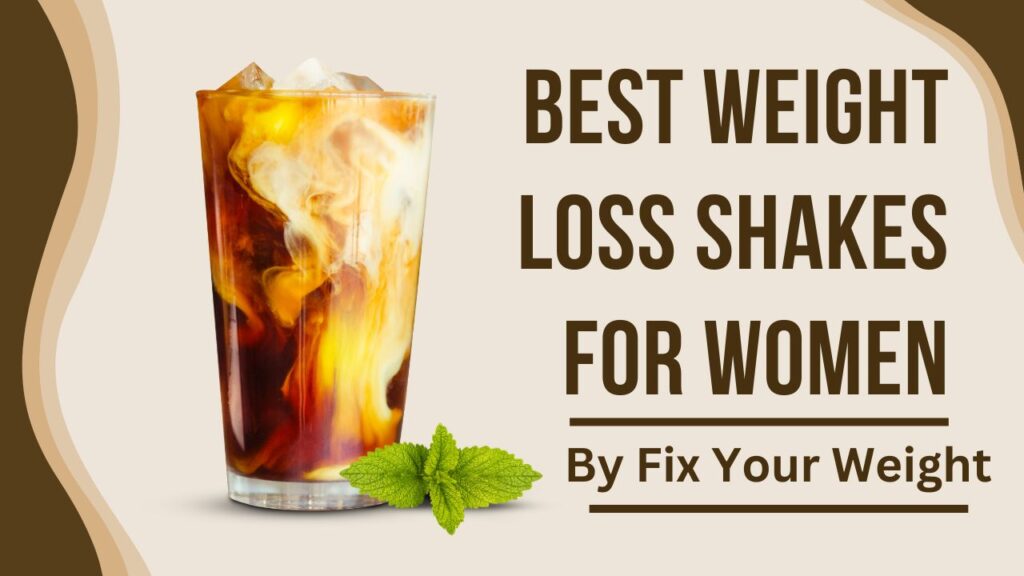Introduction of What to Eat With Hummus For Weight Loss:
Are you on a quest to shed those extra pounds while still enjoying delicious snacks? Look no further than hummus – the versatile and nutritious dip that has become a favorite among health-conscious individuals. In this article, we delve into the world of hummus and its role in weight loss. From understanding its nutritional benefits to exploring smart pairing strategies and debunking common myths, we’ve got you covered. Get ready to discover how this humble chickpea-based dip can be your secret weapon in achieving your weight loss goals. Let’s dive in
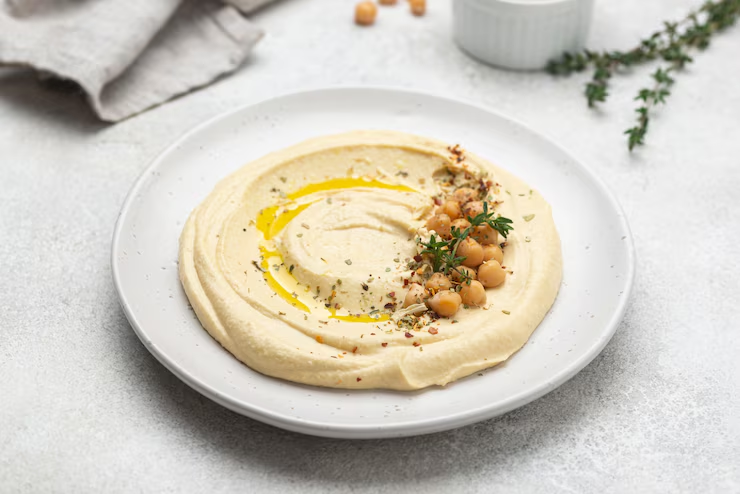
Section 1: Understanding Hummus and Weight Loss
Is Hummus Good for Healthy Weight Loss?
Hummus, a creamy blend of chickpeas, tahini, olive oil, lemon juice, and garlic, has gained popularity not only for its delicious taste but also for its potential benefits for weight loss. Despite its creamy texture, hummus is relatively low in calories compared to many other dips and spreads. Additionally, its high fiber and protein content can help promote satiety, keeping hunger at bay and reducing the likelihood of overeating.
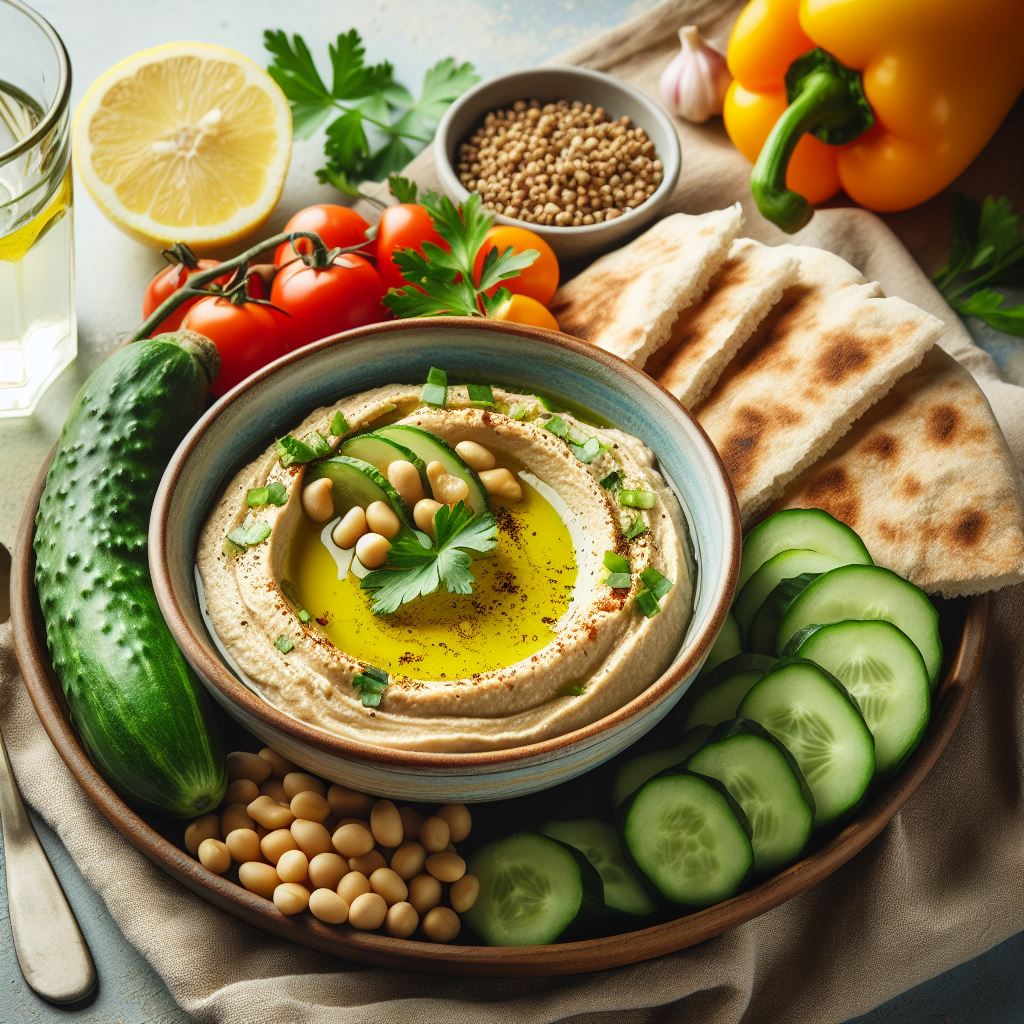
Understanding the Nutritional Value of Hummus
One of the key factors that make hummus a standout option for weight loss is its nutrient profile. Chickpeas, the main ingredient in hummus, are rich in protein, fiber, vitamins, and minerals. Protein and fiber are particularly important for weight loss as they help increase feelings of fullness and support overall digestive health. Moreover, hummus contains heart-healthy fats from olive oil and tahini, which can aid in maintaining a balanced diet.

Nutrition of Hummus
A typical serving of hummus (about two tablespoons) contains approximately 70-100 calories, depending on the brand and additional ingredients. This portion provides around 2-4 grams of protein, 4-6 grams of fat (mostly unsaturated), and 6-8 grams of carbohydrates, including 2-3 grams of fiber. Additionally, hummus offers essential vitamins and minerals such as iron, calcium, magnesium, and vitamin C.
In summary, hummus is a nutrient-dense food that can be a valuable addition to a weight loss diet. Its combination of protein, fiber, and healthy fats makes it a satisfying and nourishing option for those looking to manage their weight effectively. In the next sections, we’ll explore how you can incorporate hummus into your meals and snacks to maximize its weight loss benefits.
Section 2: Benefits of Hummus for Weight Loss
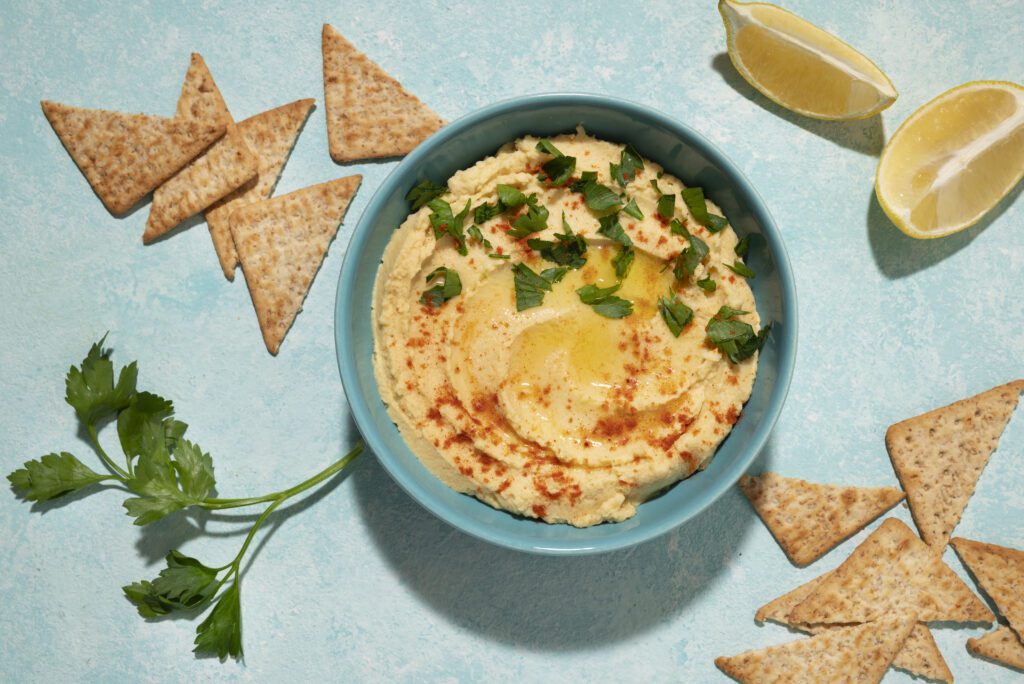
Hummus Keeps You Full for Longer
One of the primary benefits of incorporating hummus into your diet for weight loss is its ability to keep you feeling full and satisfied for longer periods. This is largely due to its high fiber and protein content. Fiber takes longer to digest, which helps slow down the emptying of your stomach and promotes feelings of fullness. Protein also plays a crucial role in appetite regulation by reducing levels of the hunger hormone ghrelin and increasing levels of satiety hormones like peptide YY.
Hummus Doesn’t Disturb Insulin Levels
Unlike some high-carbohydrate snacks that can cause rapid spikes and crashes in blood sugar levels, hummus has a low glycemic index (GI). This means it doesn’t lead to sharp increases in blood glucose levels, which can trigger insulin spikes and subsequent hunger cravings. Instead, the slow and steady release of glucose from the carbohydrates in hummus helps maintain stable blood sugar levels, providing sustained energy and reducing the risk of cravings for unhealthy snacks.
Hummus Supports a Nutrient-Rich Diet
In addition to its weight loss-friendly properties, hummus is also a nutrient-rich food that can contribute to overall health and well-being. Along with being a good source of protein and fiber, hummus contains various vitamins and minerals that are essential for bodily functions. These include iron, which is important for transporting oxygen in the blood, and magnesium, which is involved in over 300 enzymatic reactions in the body. By incorporating hummus into your diet, you can boost your intake of these essential nutrients without compromising on taste or satisfaction.
A Study on Hummus Benefits for Weight Loss
Numerous studies have investigated the potential effects of hummus consumption on weight management and overall health. One study found that individuals who regularly consumed hummus were more likely to have lower body weight and smaller waist circumference compared to non-consumers. Additionally, research suggests that including chickpeas, the primary ingredient in hummus, in a weight loss diet may lead to greater feelings of fullness and reduced calorie intake.
The benefits of hummus for weight loss extend beyond its delicious taste. Its ability to promote satiety, stabilize blood sugar levels, and support a nutrient-rich diet make it a valuable addition to any weight loss plan. By incorporating hummus into your meals and snacks, you can enjoy its numerous benefits while working towards your health and fitness goals.
Section 3: Smart Pairing Strategies
Combining Hummus and Vegetables for Weight Loss
One of the most effective ways to enjoy hummus for weight loss is by pairing it with an array of colorful vegetables. Vegetables are low in calories but high in essential nutrients, making them an ideal choice for promoting satiety and overall health. When paired with hummus, vegetables add volume and texture to your snack or meal, helping you feel fuller for longer without significantly increasing calorie intake. Some popular options for dipping include carrot sticks, cucumber slices, bell pepper strips, and cherry tomatoes.
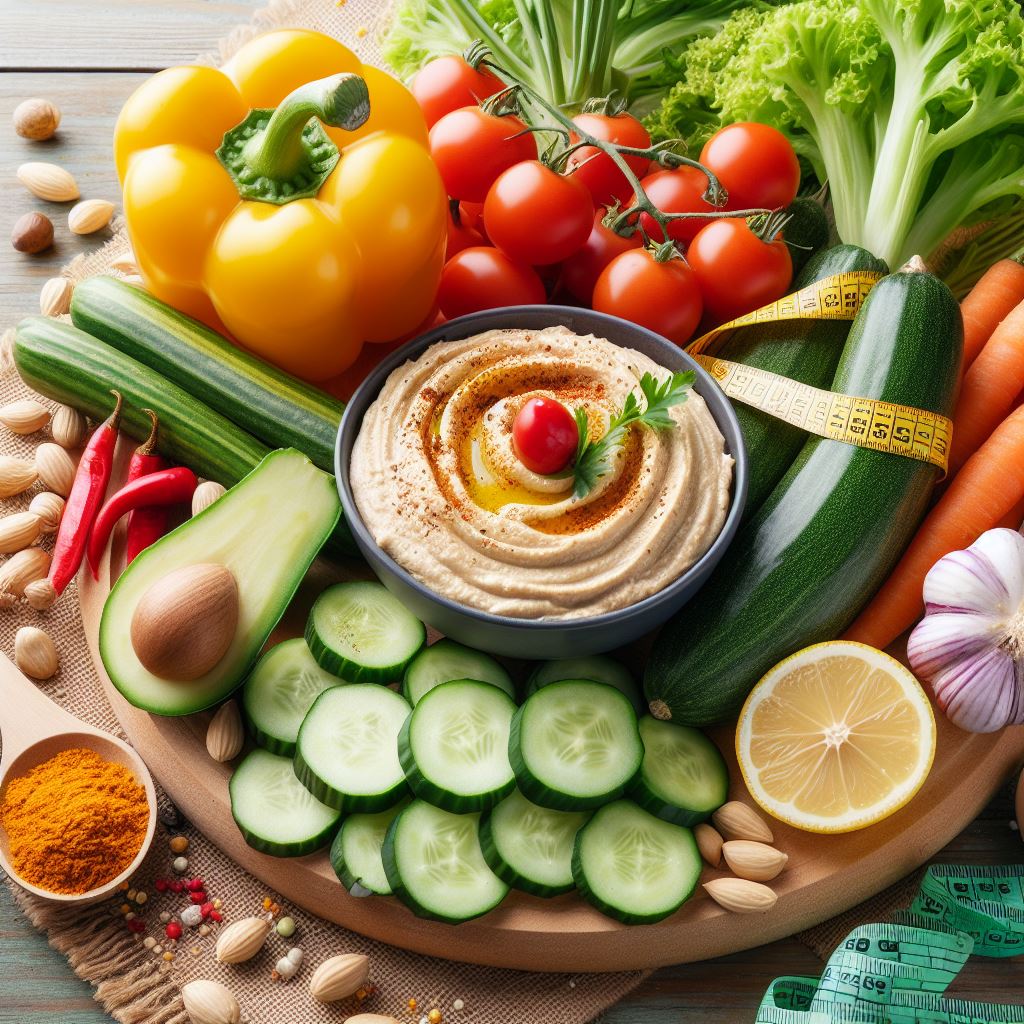
Incorporating Hummus into Your Main Meals
Beyond being a dip for veggies or chips, hummus can also be incorporated into a variety of main dishes to add flavor, texture, and nutritional value. For example, you can use hummus as a spread on sandwiches or wraps instead of mayonnaise or other high-calorie condiments. It can also serve as a creamy sauce for pasta dishes or a flavorful topping for grilled chicken or fish. By replacing less nutritious ingredients with hummus, you can create satisfying and nutritious meals that support your weight loss goals.
Smart Snacking with Hummus
When it comes to snacking, hummus shines as a healthy and satisfying option that can help curb cravings and prevent overeating. Pairing hummus with whole grain crackers or bread adds complex carbohydrates and additional fiber to your snack, enhancing its satiety factor. Alternatively, you can enjoy hummus as a topping for rice cakes or as a dip for whole grain pita chips for a satisfying crunch. By choosing nutrient-dense snacks like hummus, you can satisfy your hunger between meals without derailing your weight loss efforts.
Incorporating hummus into your diet for weight loss doesn’t have to be complicated. By focusing on smart pairing strategies and making mindful choices, you can enjoy the delicious taste and nutritional benefits of hummus while working towards your health and fitness goals. Whether you’re dipping veggies, spreading it on sandwiches, or enjoying it as a snack, hummus offers endless possibilities for satisfying and nutritious eating. Experiment with different pairings and recipes to discover how hummus can fit seamlessly into your weight loss journey.
Section 4: Yummy Ideas for Hummus Pairings
1. Sliced Veggies
Pairing hummus with sliced vegetables is not only a classic combination but also a nutritious and satisfying snack option. Vegetables like carrots, cucumbers, bell peppers, and celery provide a crunchy texture and are packed with vitamins, minerals, and fiber. Dip these veggies into hummus for a satisfying snack that will keep you feeling full and energized between meals.
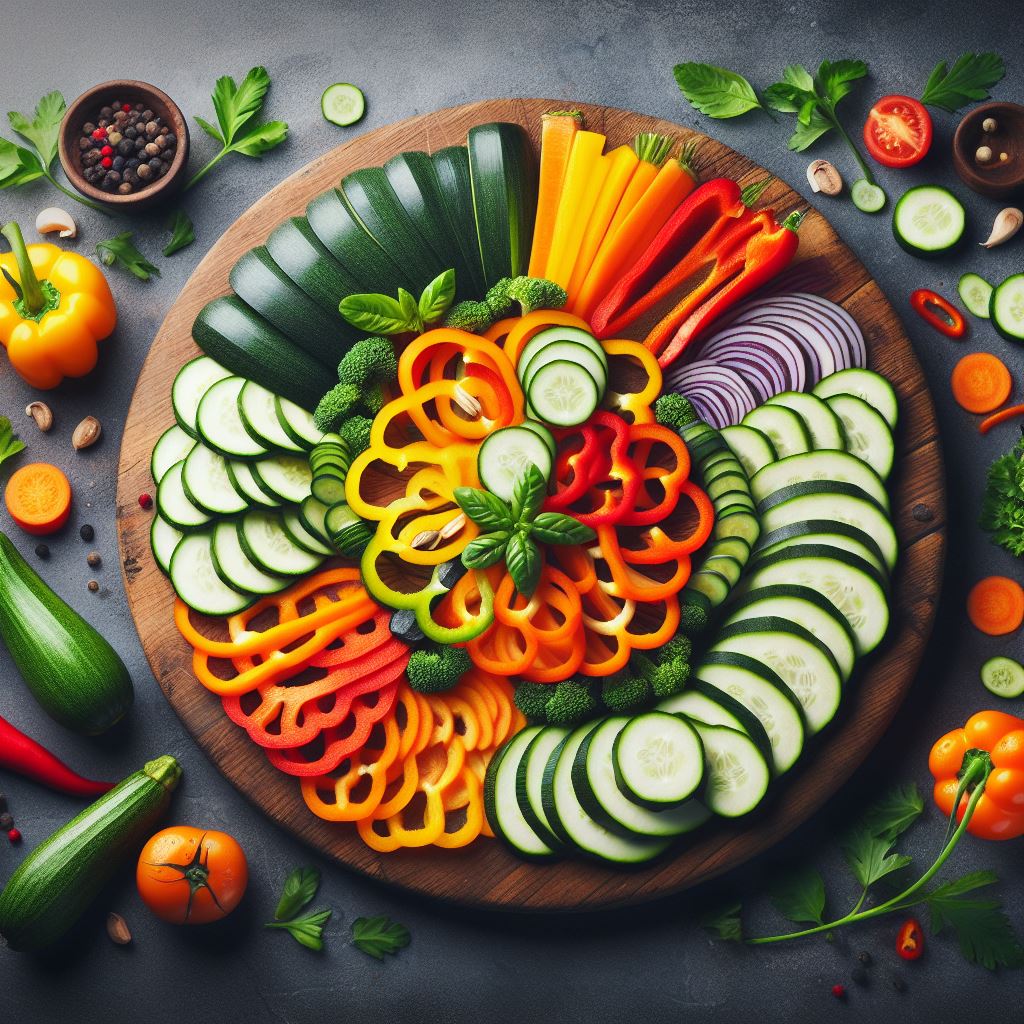
2. Deviled Eggs
For a protein-packed snack that satisfies both savory and creamy cravings, consider pairing hummus with deviled eggs. The creamy texture of hummus complements the smoothness of the egg yolk filling, creating a delicious and nutritious snack option. Plus, eggs are rich in protein and essential nutrients, making them a perfect addition to your weight loss plan.
3. Salad
Incorporating hummus into your salad can add flavor, creaminess, and nutrition without the need for heavy dressings or sauces. Use hummus as a dressing by mixing it with a splash of lemon juice or vinegar, or simply dollop it on top of your favorite salad greens. You can also use hummus as a protein-rich topping for salads featuring roasted vegetables, grains, or legumes for a satisfying and well-rounded meal.
4. Roasted Tofu
For a vegetarian-friendly option that’s high in protein and flavor, try pairing hummus with roasted tofu. Simply marinate tofu cubes in your favorite spices, then roast until golden and crispy. Serve the roasted tofu alongside hummus for dipping or incorporate them into wraps or bowls for a satisfying and nutritious meal.
5. Berries
For a sweet and savory flavor combination, pair hummus with fresh berries such as strawberries, blueberries, or raspberries. The sweetness of the berries complements the creamy texture of the hummus, creating a delicious and nutritious snack option. Berries are also rich in antioxidants, vitamins, and fiber, making them an excellent choice for supporting overall health and weight loss.
6. Pita Chips
For a crunchy and satisfying snack option, pair hummus with whole grain pita chips. Whole grain pita chips provide complex carbohydrates and fiber, while hummus adds protein and healthy fats, creating a balanced and nutritious snack. Choose whole grain pita chips with minimal added ingredients and pair them with hummus for a satisfying snack that will keep you feeling full and energized between meals.
Experiment with these delicious pairing ideas to discover your favorite ways to enjoy hummus for weight loss. Whether you prefer savory or sweet flavors, there are endless possibilities for incorporating hummus into your diet in a way that supports your health and fitness goals.
Section 5: Frequently Asked Questions
Is Hummus Protein?
Yes, hummus is a good source of plant-based protein. It contains a combination of protein-rich ingredients such as chickpeas and tahini (sesame seed paste), making it a suitable option for vegetarians and vegans looking to increase their protein intake. A two-tablespoon serving of hummus typically provides around 2-4 grams of protein, depending on the brand and recipe.
How Long is Hummus Good For?
The shelf life of hummus can vary depending on factors such as storage conditions and the presence of preservatives. Generally, store-bought hummus that is unopened can last for about one to two weeks when refrigerated. Once opened, it’s best to consume hummus within 3-5 days for optimal freshness and flavor. To prolong the shelf life of homemade hummus, store it in an airtight container in the refrigerator and consume it within 3-5 days.
Is Hummus Fattening?
While hummus does contain fats from ingredients like olive oil and tahini, it’s important to note that these are primarily healthy unsaturated fats. These fats are beneficial for heart health and can help keep you feeling full and satisfied. Additionally, hummus is relatively low in calories compared to many other dips and spreads, making it a nutritious and satisfying option for weight loss when consumed in moderation as part of a balanced diet.
Hummus is a versatile and nutritious food that can be enjoyed as part of a healthy diet for weight loss. Its protein-rich and fiber-rich composition, combined with its delicious taste and versatility, make it a valuable addition to any weight loss plan. By incorporating hummus into your meals and snacks, you can reap its numerous benefits while working towards your health and fitness goals.
Section 6: Potential Pitfalls and Foods to Avoid
While hummus can be a nutritious and satisfying addition to a weight loss diet, it’s important to be mindful of potential pitfalls and foods that may not be the best choice when paired with hummus.
Foods to Sidestep When Pairing with Hummus
High-Calorie Dippers:
Avoid pairing hummus with high-calorie dipping options such as potato chips, crackers with added sugars or fats, or fried foods. These can quickly add up in calories and detract from the health benefits of hummus.
Excessive Portions:
While hummus is nutritious, it’s still calorie-dense, so it’s essential to practice portion control. Be mindful of the amount of hummus you’re consuming, especially when pairing it with other foods.
Processed Meats:
Avoid pairing hummus with processed meats like bacon, sausage, or deli meats that are high in saturated fats and sodium. Opt for lean protein options like grilled chicken, tofu, or hard-boiled eggs instead.
Sweetened Condiments:
Be cautious of pairing hummus with sweetened condiments or spreads like honey or jam, as these can add unnecessary sugars and calories. Instead, opt for savory toppings or spices to enhance the flavor of your hummus.
High-Calorie Beverages:
When enjoying hummus as part of a meal or snack, be mindful of the beverages you’re consuming alongside it. Sugary drinks like soda, sweetened teas, or fruit juices can add extra calories without providing much nutritional value.
By being mindful of these potential pitfalls and making smart choices when pairing hummus with other foods, you can maximize its benefits for weight loss and overall health. Focus on pairing hummus with nutrient-rich foods like vegetables, whole grains, and lean proteins to create balanced and satisfying meals and snacks that support your weight loss goals.
Conclusion:
Hummus stands out as a flavorful, nutrient-rich, and versatile addition to any weight loss regimen. Its combination of protein, fiber, and healthy fats not only promotes satiety but also supports stable blood sugar levels and overall health. By incorporating hummus into meals and snacks, individuals can enjoy a delicious array of pairing options while reaping the benefits of its wholesome ingredients. However, it’s crucial to maintain portion control and make mindful choices when selecting accompanying foods to maximize its weight loss potential. With its numerous benefits and endless possibilities for culinary creativity, hummus proves to be a delicious and satisfying ally on the journey to achieving and maintaining a healthy weight.
FAQs:
1. What can I dip in hummus for weight loss?
When aiming for weight loss, opt for nutrient-rich, low-calorie options to dip in hummus. Vegetables like carrot sticks, cucumber slices, bell pepper strips, and celery sticks are excellent choices. These provide fiber, vitamins, and minerals while keeping calorie intake in check.
2. Can I eat hummus while trying to lose weight?
Yes, hummus can be part of a weight loss diet when consumed in moderation. It’s a nutritious option rich in protein and healthy fats that can help keep you satisfied between meals. Pairing it with vegetables or whole-grain crackers can make a filling and satisfying snack or meal component.
3. What pairs well with hummus?
Hummus pairs well with a variety of foods. For a balanced meal or snack, consider pairing it with whole-grain crackers, pita bread, or fresh vegetables. Additionally, olives, cherry tomatoes, feta cheese, or a drizzle of olive oil can add extra flavor and nutrients.
4. What is a low-calorie snack to eat with hummus?
Opt for low-calorie options like cucumber slices, carrot sticks, celery sticks, or cherry tomatoes to enjoy with hummus. These choices provide vitamins, minerals, and fiber while keeping calorie intake in check.
5. What is the best snack for weight loss?
The best snacks for weight loss are those that are nutrient-dense, satisfying, and portion-controlled. Options like hummus with vegetable sticks, Greek yogurt with berries, or a handful of nuts are great choices. They provide protein, fiber, and healthy fats to keep you feeling full and satisfied.
6. How much hummus per day?
Moderation is key when consuming hummus for weight loss. Aim for about 2-4 tablespoons of hummus per serving, depending on your calorie and nutritional needs. Be mindful of portion sizes to control calorie intake.
7. What can I put on plain hummus?
To enhance the flavor of plain hummus, consider topping it with a drizzle of olive oil, a sprinkle of paprika, chopped fresh herbs like parsley or cilantro, or a few pine nuts or sesame seeds for added texture and flavor.
8. What is good to add to plain hummus?
Adding ingredients like roasted garlic, sun-dried tomatoes, roasted red peppers, or roasted eggplant can elevate the flavor of plain hummus. These additions not only enhance the taste but also provide extra nutrients and antioxidants.
9. What do Arabs eat hummus with?
In Arab cuisine, hummus is commonly enjoyed with fresh pita bread or Arabic bread. It’s also served alongside dishes like falafel, grilled meats, or as part of a mezze platter with olives, pickles, and other dips like baba ganoush.
10. What protein can I eat with hummus?
Hummus itself is a good source of plant-based protein. However, if you’re looking to add more protein to your meal or snack, consider pairing hummus with grilled chicken, turkey slices, hard-boiled eggs, or tofu. These options provide additional protein to support satiety and muscle health.
11. Are eggs and hummus good together?
Yes, eggs and hummus can be a nutritious and satisfying combination. Hard-boiled eggs or scrambled eggs can be paired with hummus for a balanced meal or snack. Eggs provide high-quality protein and essential nutrients, while hummus adds flavor, fiber, and healthy fats.


